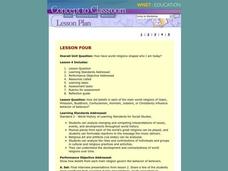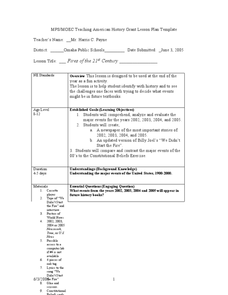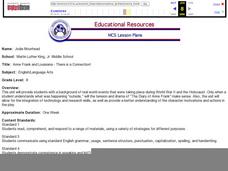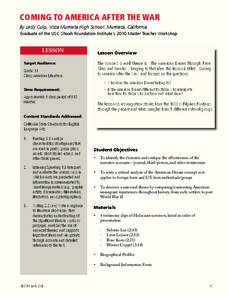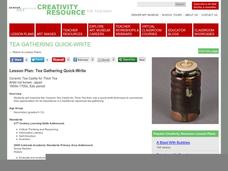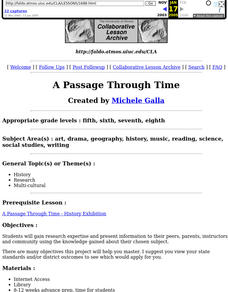Curated OER
End of World War II
Ninth graders examine the results of the Yalta Conference on Europe after the war. They develop a PowerPoint presentation that compare the effects of World War I and World War II. They write a journal entry taking the point of view of...
Curated OER
Introduction to World Religions: Islam
Sixth graders explore religion by viewing a presentation in class. In this global culture lesson, 6th graders define the Islam religion and the stories that accompany it. Students read the story "Muhammad" by Demi and view an Internet...
Curated OER
Spain and France Influence in Europe and in the New World
Learners examine the conditions in France and Spain during the Middle Ages and the Discovery of America. In groups, they compare and contrast the political situations in both countries and what effect they had on the New World. To end...
Curated OER
The Art of El Anasui: Creating a Mural with Discarded/Recycled Objects
Students create murals that feature recycled objects. In this West African art lesson, students examine artwork by El Anatsui and his commentary on social issues. Students then create murals in the style of El Anatsui using discarded...
Curated OER
Social Studies: Ancient China
Seventh graders examine the contributions and influences of dynasties on Chinese history. They role-play as citizens during selected dynasties and write daily autobiographical entries. Students complete projects on the geography,...
Curated OER
Reflections of Ancient Greece
Students study ancient Greek civilization. In this World history lesson, students locate Greece on a world map and review what the ancient Greeks did when they developed new ideas for government, science, philosophy, religion,...
Curated OER
How have world religions shaped who I am today?
Students analyze changing and competing interpretations of issues, events, and developments throughout world history. They analyze the roles and contributions of individuals and groups in cultural and religious practices and activities.
Curated OER
Fires of the 21st Century
High schoolers explore historical perspectives. In this contemporary history lesson, students listen to Billy Joel's "We Didn't Start the Fire," discuss they lyrics, and add a new verse to the song for the years 2002, 2003, 2004,...
Curated OER
Nureyev: After Petipa
Students examine dance and choreography in Russian history. In this Russian history lesson, students discover details about Russian ballet and the work of Marius Petipa as they conduct independent research and present their findings to...
Curated OER
Create a World
Students combine imaginative powers with known map-making techniques to create a whole new world.
Curated OER
Anne Frank and Louisiana - There is a Connection!
How is Louisiana connected to the Holocaust? After reading The Diary of Anne Frank, eighth graders complete a research report about a survivor of the Holocaust who currently resides in Louisiana. Though the idea is a good way to...
Curated OER
In Search Of Wisdom: An Interview With An Elder
The key to writing a good narrative is having good material to work with; and the key to getting good material is asking good questions. Working in groups, class members brainstorm questions that might result in the most interesting...
Curated OER
Beowulf: Songs of Ancient Heroes
Introduce your class to epic heroes with these activities for Beowulf. After watching a video clip, taking notes on heroes, and tracking characteristics of heroism throughout Beowulf, class members retell an episode of Beowulf using a...
Curated OER
Everybody Cooks Rice
Students read the book, "Everybody Cooks Rice," and they participate in activities pertaining to the book. They identify countries mentioned in the text and locate them on a world map. They use an atlas to identify the climatic...
Indian Land Tenure Foundation
Tribal Origin Stories
The teacher reads and retells Californian tribal origin or creation stories that come from the traditions of a variety of California Indian tribes. Then, pupils get together in groups and retell the stories they just heard; just as...
University of Southern California
Coming to America After the War
As part of their exploration of the American dream, class members examine primary source materials to compare immigrant experiences of those arriving early in our country's history to those arriving in the US after World War...
Curated OER
Heeding Advice
Compare and contrast various foreign perspectives on the George W. Bush administration's plans for military action. Middle schoolers read the article "Blair and Chirac Head to U.S. to Talks and a Show of Unity." Then, they analyze...
Curated OER
Anne Frank: One of Hundreds of Thousands
Young scholars conduct research to put Anne Frank's diary into historical context. They use maps, timelines, essays and websites to examine the early victories of the German army, paying special attention to the Netherlands and...
Denver Art Museum
Tea Gathering Quick-Write
Japanese tea gatherings are the inspiration for a great lesson. Learners are provided with an image of a tea caddy made for thick tea and asked to describe what they notice and what that might mean. This leads into a larger lesson about...
Curated OER
Children of War
Take a closer look at the impact of war in this language arts and social studies lesson plan. Middle schoolers use primary sources to conduct research as they relate to the effects of war on children. They compare and contrast the...
National Park Service
The Power of Remembrance
On every July 4th, we watch fireworks and celebrate our independence, but how is the history of the American Revolution preserved? Four social studies instructional activity guide learners through different memorials, commemorative...
Curated OER
In Old Pompeii
Students investigate the history of Pompeii and its destruction. They take a virtual field trip to the ruins of Pompeii, create a travel brochure to attract tourists to the site, and write an account of their trip.
Curated OER
A Passage Through Time
Young learners research and present information about a chosen subject to their peers, parents, instructors, and community. This lesson has a strong research and public speaking component, and would be ideal for your higher level students.
PBS
Evolution of the Presidency: Theodore Roosevelt to Franklin D. Roosevelt
How much power should a president be allowed to exert? Theodore Roosevelt and Franklin D. Roosevelt exercised their power according to their interpretations of the United States Constitution, and these interpretations affected the...






